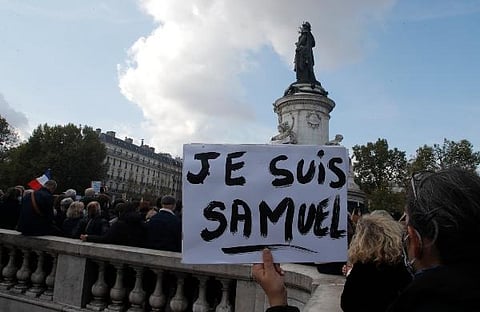

Freedom of expression is sacrosanct and the right to express an opinion even at the risk of giving offence is inalienable. Yet, this foremost of democratic principles is usually under attack, more so in the wake of chilling crimes against those who have dared to antagonise extremists. Outrage especially when escalated by social media has deadly consequences.
In Paris, the beheading of a teacher, Samuel Paty, after he shared caricatures of the Prophet Muhammad with his pupils has led to widespread horror and condemnation. He was allegedly attacked by an 18-year-old who was later shot dead by police officials.
The tragedy is the second attack to take place during the trial of those behind the appalling Charlie Hebdo massacre in January 2015. Fourteen people are currently being tried for the killings at the French satirical newspaper.
Shortly after the trial commenced this year, two members of a television production company were stabbed outside the former premises of Charlie Hebdo in response to the newspaper’s decision to republish their controversial and inflammatory caricatures of Muhammad in pornographic poses.
Paty’s demise following this attack has reignited the debate surrounding free speech. Back home, a feel good ad that inadvertently sparked indignation was taken down when pressured by right wing trolls which in turn generated outrage among liberal wokesters. This has drawn attention to questions pertaining to personal and professional liberties being curtailed in a prevailing atmosphere of increasing intolerance.
There are many who stand firmly behind democratic principles but many more are asking if freedom of expression is worth it. Nobody (or at least anybody with a shred of decency) denies that it is indisputably wrong and unforgivable to kill people for their ideas, opinions and cartoons but there are also those who wonder if free speech justifies upsetting religious sentiments, jeopardising interfaith harmony and risking death.
Charlie Hebdo like the ghouls on social media have prided themselves on their vulgarity, crude depictions, irreverence for all things religious, and staunch refusal to incorporate nuance, subtlety, thoughtfulness or good taste into their editorial decisions. Personally, I found their cartoons of three-year-old Aylan Kurdi, a Syrian refugee whose drowned body had washed up in Turkey, disgusting and distasteful in the extreme.
However, as a matter of principle, it is important not to indulge those who take offence and feel free to be as thuggish as they please with negligible respect for the rights of others. By urging people to recalibrate their sensitivities and sensibilities perhaps we can lessen the impact of virulent outrage and outright hatred. We also need to remember that freedom and tolerance are never without limits. Nothing endangers liberty more than a tendency to take it too far.
(The writer's is an author and new age classicist. She can be contacted at anujamouli@gmail.com)